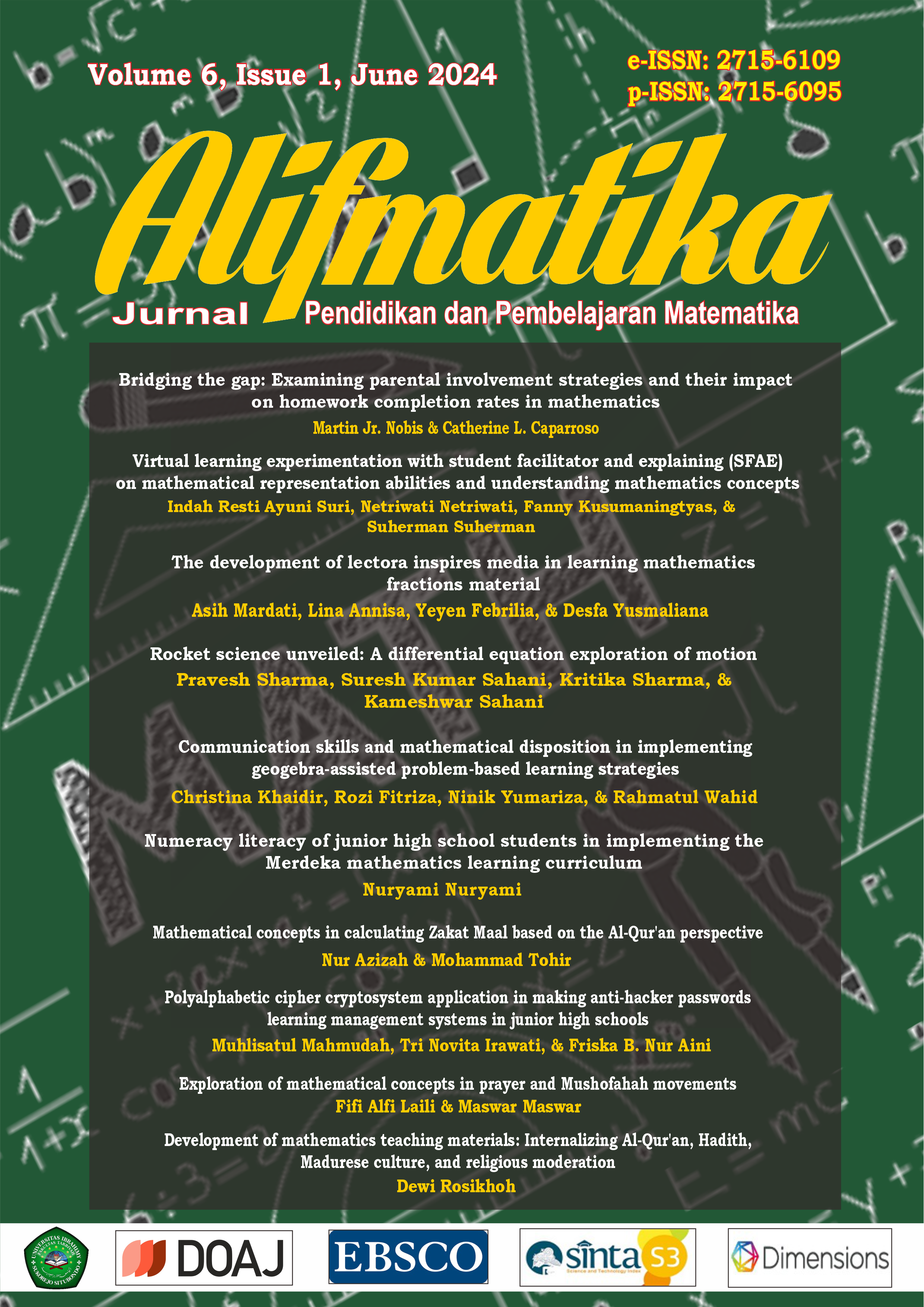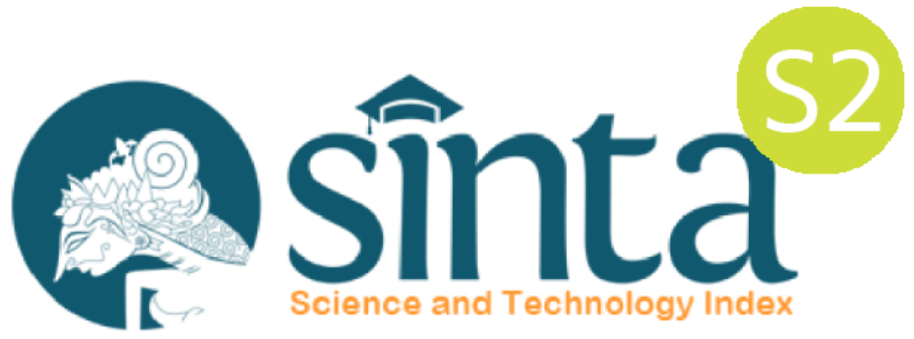Mathematical concepts in calculating Zakat Maal based on the Al-Qur'an perspective
DOI:
https://doi.org/10.35316/alifmatika.2024.v6i1.78-89Keywords:
Al-Qur'an Perspective, Mathematical Concepts, Zakat MaalAbstract
This research aims to reveal mathematical concepts in calculating Zakat Maal as explained in the Al-Qur'an. This research is qualitative descriptive research with a literature review type. The sources used as references in writing are the Al-Qur'an, books, and national and international journals relevant to the research study. The data collection methods used are observation and documentation, while the data analysis technique used in this research is content analysis. The results of the research show that mathematical concepts are found in Zakat Maal, namely in gold and silver Zakat, trade Zakat and professional Zakat (the concept of relations and functions, the idea of sets), agricultural Zakat and Rikaz ZAKAT (the concept of fractional rational numbers). The recommendation for further research is to expand the literature in the hope that later, we can obtain better results and discussions and develop an exploration of other mathematical concepts in calculating Zakat Maal.
Downloads
References
Ab Rahman, M. F., Ab Rahman, A., & Ab Rahim, S. F. (2019). Agricultural Zakat from the Islamic perspective: Agricultural Zakat from the Islamic perspective. Journal of Fatwa Management and Research, 17(2), 92–118. https://doi.org/10.33102/jfatwa.vol0no0.276
Alpers, B. A., Demlova, M., Fant, C.-H., Gustafsson, T., Lawson, D., Mustoe, L., Olsen-Lehtonen, B., Robinson, C., & Velichova, D. (2014). A framework for mathematics curricula in engineering education: a report of the mathematics working group. European Society for Engineering Education (SEFI). https://repository.lboro.ac.uk/articles/report/A_framework_for_mathematics_curricula_in_engineering_education_a_report_of_the_mathematics_working_group_/9367541
Dreyfus, T., & Eisenberg, T. (2012). On different facets of mathematical thinking. In The nature of mathematical thinking (pp. 253–284). Routledge. https://www.taylorfrancis.com/chapters/edit/10.4324/9780203053270-14/different-facets-mathematical-thinking-tommy-dreyfus-theodore-eisenberg
Haerul, H., Iqra, I., Al, B. M. A. M. H., & ELSakhawy, R. M. (2023). The role of the teacher in instilling tauhid-based education in students in the perspective of the Qur’an. Solo Universal Journal of Islamic Education and Multiculturalism, 1(1), 50–57. https://doi.org/10.61455/sujiem.v1i01.35
Haigh, J. (2016). Mathematics in everyday life. Springer. https://link.springer.com/book/10.1007/978-3-030-33087-3
Haris, G. (2020). The application of dynamic Zakat percentage by Yusuf al-qaradawy on the professional Zakat in Indonesian BAZNAS. Asy-Syir’ah: Jurnal Ilmu Syari’ah Dan Hukum, 54(2), 299–317. https://doi.org/10.14421/ajish.v54i2.922
Hiebert, J., & Lefevre, P. (2013). Conceptual and procedural knowledge in mathematics: An introductory analysis. In Conceptual and procedural knowledge (pp. 1–27). Routledge. https://www.taylorfrancis.com/chapters/edit/10.4324/9780203063538-1/conceptual-procedural-knowledge-mathematics-introductory-analysis-james-hiebert-patricia-lefevre
Irfan, I., Muhyarsyah, M., Marpaung, A. P., & Liswanty, I. (2020). Reconstruction from the aspects of Islamic law in corporate Zakat accounting. Jurnal Akuntansi Dan Auditing Indonesia, 139–147. https://doi.org/10.20885/jaai.vol24.iss2.art7
Julie, C. (2013). The stability of learners’ choices for real-life situations to be used in mathematics. International Journal of Mathematical Education in Science and Technology, 44(2), 196–203. https://doi.org/10.1080/0020739X.2012.703337
Kasdi, A. (2019). Actualizations of Maqāşid Al-Shariah in modern life; Maqāşid Al-shariah theory as a method of the development of Islamic laws and Shariah economics. Justicia Islamica, 16(2), 247–268. https://doi.org/10.21154/justicia.v16i2.1666
Kementerian Agama, R. I. (2014). Al-Qur’an dan Terjemahan [Al-Qur'an and Translation]. Diponegoro.
Kuhrmann, M., Fernández, D. M., & Daneva, M. (2017). On the pragmatic design of literature studies in software engineering: An experience-based guideline. Empirical Software Engineering, 22, 2852–2891. https://doi.org/10.1007/s10664-016-9492-y
Lynn, M. R. (2018). Popular science and public opinion in eighteenth-century France. In Popular science and public opinion in eighteenth-century France. Manchester University Press. https://doi.org/10.7765/9781526130457
Mainali, B. (2021). Representation in teaching and learning mathematics. International Journal of Education in Mathematics, Science and Technology, 9(1), 1–21. https://doi.org/10.46328/ijemst.1111
Mattson, I. (2012). The story of the Qur’an: its history and place in Muslim life. John Wiley & Sons. https://ixtheo.de/Record/526109599
Moreau, M., Mendick, H., & Epstein, D. (2010). Constructions of mathematicians in popular culture and learners’ narratives: a study of mathematical and non‐mathematical subjectivities. Cambridge Journal of Education, 40(1), 25–38. https://doi.org/10.1080/03057640903567013
Mujahiddin, A., & Annas, M. (2023). Konsep Tartil dan pengaruh penerapannya dalam membaca Al-Qur’an [The concept of Tartil and the influence of its application in reading the Al-Qur'an]. Ulumul Qur’an: Jurnal Kajian Ilmu Al-Qur’an Dan Tafsir, 3(2), 201–216. https://ojs.stiudq.ac.id/JUQDQ/article/view/164
Muniri, M. (2016). Kontribusi matematika dalam konteks Fikih [Contributions of mathematics in the context of Fiqh]. Ta’allum: Jurnal Pendidikan Islam, 4 (2), 193–214. https://doi.org/10.21274/taalum.2016.4.2.193-214
Okoli, C. (2015). A guide to conducting a standalone systematic literature review. Communications of the Association for Information Systems, 37. https://hal.science/hal-01574600/
Owoyemi, M. Y. (2020). Zakat management: The crisis of confidence in Zakat agencies and the legality of giving Zakat directly to the poor. Journal of Islamic Accounting and Business Research, 11(2), 498–510. https://doi.org/10.1108/JIABR-07-2017-0097
Ramadhani, S. L., & Salimah, Y. M. (2024). Peranan matematika terhadap ilmu fiqih: pentingnya belajar menghitung pengeluaran Zakat bagi umat muslim [The role of mathematics in the science of jurisprudence: the importance of learning to calculate Zakat expenditure for Muslims]. Religion: Jurnal Agama, Sosial, Dan Budaya, 3(2), 415–420. https://doi.org/10.55606/religion.v3i2.952
Rezzi, F., Hamdani, H., & Nursangaji, A. (2023). Eksplorasi konsep fungsi dalam ibadah Zakat [Exploration of the concept of function in Zakat worship]. Jurnal Education and Development, 11(2), 87–94. https://doi.org/10.37081/ed.v11i2.4592
Rifa’i, A., & Marhamah, M. (2020). The method of messenger of Allah in Al-Qur’an learning. Journal of Educational and Social Research, 10(3), 131–140. https://doi.org/10.36941/jesr-2020-0053
Roziqin, M. K. (2019). Hubungan Al-Qur’an dengan matematika [The relationship between the Al-Qur'an and mathematics]. EDUSCOPE: Jurnal Pendidikan, Pembelajaran, Dan Teknologi, 5(1), 55–65. https://doi.org/10.32764/eduscope.v5i1.375
Snyder, H. (2019). Literature review as a research methodology: An overview and guidelines. Journal of Business Research, 104(11), 333–339. https://doi.org/10.1016/j.jbusres.2019.07.039
Surianto, S. (2022). Matematika dalam Al-Qur’an [Mathematics in the Al-Qur'an]. Al-’Adad: Jurnal Tadris Matematika, 1(1), 60–71. https://doi.org/10.24260/add.v1i1.811
Tap, W. D. (2021). Teaching and learning mathematics for understanding, enjoyment and everyday life experiences. In Insights Into Global Engineering Education After the Birth of Industry 5.0. IntechOpen. https://doi.org/10.5772/intechopen.99101
Torres-Carrión, P. V., González-González, C. S., Aciar, S., & Rodríguez-Morales, G. (2018). Methodology for systematic literature review applied to engineering and education. 2018 IEEE Global Engineering Education Conference (EDUCON), 1364–1373. https://doi.org/10.1109/EDUCON.2018.8363388
Vos, P. (2018). “How real people really need mathematics in the real world” Authenticity in mathematics education. Education Sciences, 8(4), 195. https://doi.org/10.3390/educsci8040195
Wohlin, C. (2014). Guidelines for snowballing in systematic literature studies and a replication in software engineering. Proceedings of the 18th International Conference on Evaluation and Assessment in Software Engineering, 1–10. https://doi.org/10.1145/2601248.2601268
Yilmaz, I. (2021). Muslims, sacred texts, and laws in the modern world. Handbook of Contemporary Islam and Muslim Lives, 12(8), 19–37. https://doi.org/10.1007/978-3-030-32626-5_5
Downloads
Published
How to Cite
Issue
Section
License
Copyright (c) 2024 Alifmatika: Jurnal Pendidikan dan Pembelajaran Matematika

This work is licensed under a Creative Commons Attribution-ShareAlike 4.0 International License.
COPYRIGHT NOTICE
Author (s) who publish in Alifmatika: Jurnal Pendidikan dan Pembelajaran Matematika agree to the following terms:
- The Author (s) submitting a manuscript do so on the understanding that if accepted for publication, copyright of the article shall be assigned to Alifmatika: Jurnal Pendidikan dan Pembelajaran Matematika, Tarbiyah Faculty of Ibrahimy University as the publisher of the journal. Consecutively, author(s) still retain some rights to use and share their own published articles without written permission from Alifmatika: Jurnal Pendidikan dan Pembelajaran Matematika. This work is licensed under a Creative Commons Attribution-ShareAlike 4.0 International License.
- Copyright encompasses rights to publish and provide the manuscripts in all forms and media for the purpose of publication and dissemination, and the authority to enforce the rights in the manuscript, for example in the case of plagiarism or in copyright infringement.
- Alifmatika: Jurnal Pendidikan dan Pembelajaran Matematika and the Editors make every effort to ensure that no wrong or misleading data, opinions or statements be published in the journal. In any way, the contents of the articles and advertisements published in Alifmatika: Jurnal Pendidikan dan Pembelajaran Matematika are the sole responsibility of their respective authors and advertisers.
- The Copyright Transfer Form can be downloaded here [Copyright Transfer Form Alifmatika]. The copyright form should be signed originally and send to the Editorial Office in the form of original mail, scanned document to alifmatika[at]ibrahimy.ac.id or upload the scanned document in the comments column when sending the manuscript.























_by_Matematohir.jpg)






